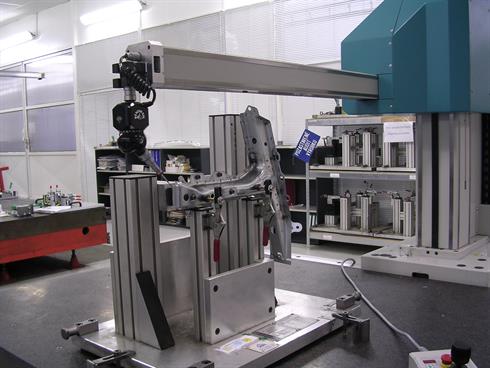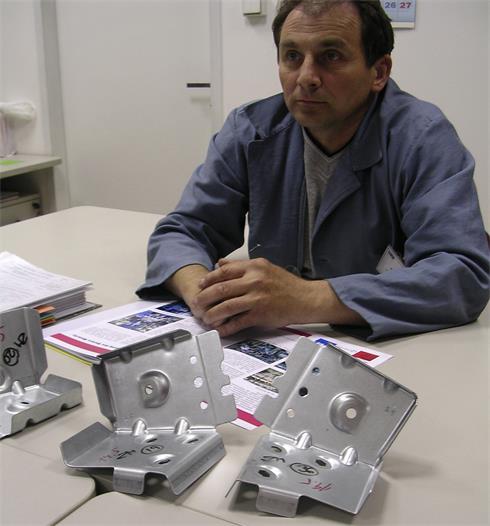현재 사용 중인 언어로는 이 페이지를 사용할 수 없습니다. Google Translate을 사용하여
자동 번역된 페이지
를 볼 수 있습니다. Renishaw에게는 이 서비스를 제공할 책임이 없으며 번역 결과를 저희가 확인하지도 않았습니다.
추가로 도움이 필요하시면
저희에게 연락해 주십시오.
Flexible consistent inspection at Porsche part supplier
Tower Malacky, the Slovakian subsidiary of US company Tower, is a leading supplier of pressed parts to blue-chip motor manufacturers across Europe, such as Porsche and Volkswagen.
Precision co-ordinate measuring machines are at the heart of the company's rigorous quality control programmes, and a recent low-cost upgrade of these machines with Renishaw's TP20 stylus-changing probe system has given the company dramatic benefits. This simple upgrade has saved hours of set-up time and significantly improved process repeatability.
Inspection of components takes place on two automatic CMMs, typically taking 3 hours to measure complex parts. Multiple points are taken on critical surfaces, comparing measured values to CAD data.
Benefits of stylus changing
Because of the complexity of features, virtually every part needs both a straight and cranked stylus arrangement to make contact with all the specified points in one set-up (the stylus is the stem and ball attached to the end of the CMM's probe sensor). Renishaw's TP20 probe system, fitted to both CMMs, allows the stylus configuration to be changed in seconds, with no need to re-qualify the stylus tip's position.

The highly repeatable magnetic kinematic coupling allows the stylus module to simply 'snap' on and off whilst ensuring the tip is accurately re-positioned. Although the ability to swap manually between two stylus modules is the most basic use of the TP20, it has eliminated hours of manual, non-productive time on an expensive automated machine.
High quality standards
Viliam Zigo, Quality Manager, has no doubts about the importance of the probe system – "Without Renishaw's TP20, the technicians would be constantly unscrewing and screwing in styli, spending several minutes re-qualifying the CMM each time – inspection throughput would reduce to less than half. Certain parts could not be inspected at all without changing modules."
Finished pressed parts and other bought-in items, are all subject to sample inspection, to ensure compliance with the high tolerances demanded by their automotive customers. For each production run, 100% of the features on a sample part are inspected on the CMMs. If this part is within tolerance, then the rest of the batch, usually thousands of parts, will meet specification.
For example, 10 points are taken on a particular flange measuring 70 mm by 20 mm; if any vary from nominal position by more than 0.5 mm the part is rejected and production is halted. Flatness and form are very important, so inspection of features such as corner radiuses must be carefully controlled.

Without Renishaw's TP20, the technicians would be constantly unscrewing and screwing in styli, spending several minutes re-qualifying the CMM each time – inspection throughput would reduce to less than half. Certain parts could not be inspected at all without changing modules.
Tower Malacky (Slovakia)
Background
Tower Malacky, based in the town of Malacky, near Bratislava in the Slovak Republic, has a long history in the supply of automotive components. At the end of 1999, the company was bought by the US company Tower and now supplies a wide range of manufacturers, including Porsche, Volkswagen, Skoda, Opel, Suzuki, and Saab. Various processes are in use in the Malacky factory - parts are pressed, sub-components are welded into assemblies and press tools are manufactured. There are 24 large presses, 20 small presses, 33 welding robots and 10 fully automated welding centres.
Tooling is fully traceable - every tool is measured on the CMMs and a quality certificate produced that proves each critical feature is within tolerance. If the certificate is lost then the tool is not used in production.
The company operates a culture of quality as an integral part of all manufacturing – there is no separate inspection department, and operators are responsible for the quality of the parts they produce. Each operator has to inspect their components on the CMMs and the upgrade to Renishaw's TP20 stylus changing probe system has ensured that this process is consistent between operators, and minimises delays.

